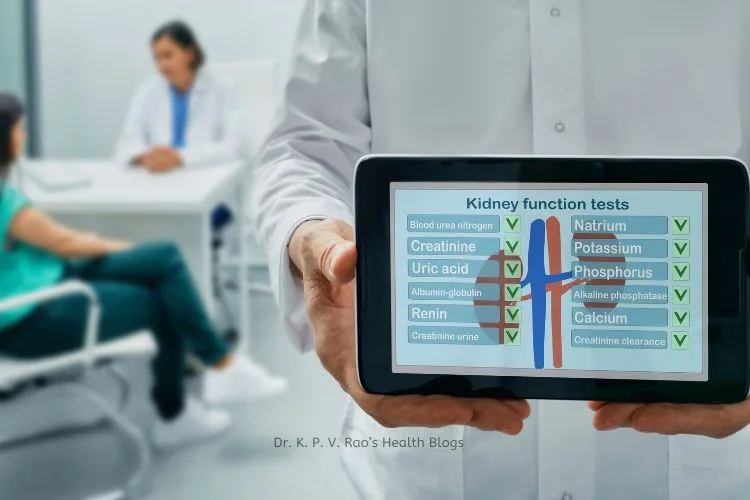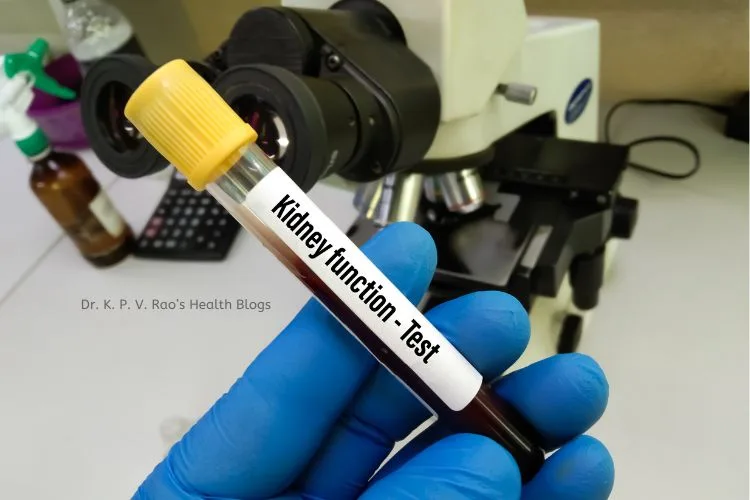What are Kidney function tests and why are they done?
Kidney function tests, also known as renal function tests or RFT, are medical exams performed to assess the functioning of the kidneys. There are times when your doctor doubts that you have some or the other kidney problem and he may order these tests to be done.
In this article we will learn what they are and how to interpret them, so that you are also well prepared to tackle the kidney issue your doctor pointed out.
Why are they ordered by your doctor?
They are done to evaluate the kidneys’ ability to filter waste products from the blood, maintain electrolyte balance, regulate fluid levels, and produce urine.
These tests help diagnose kidney diseases, monitor the progression of renal conditions, and assess the overall health of the kidneys.

What are Kidney Function Tests?
Kidney function tests are medical assessments that evaluate how well your kidneys are working. A look at the picture above will let you know which are the tests that your doctor may order for you.
These tests provide valuable information about your kidney health by measuring various markers, such as creatinine, blood urea nitrogen (BUN), and glomerular filtration rate (GFR).
The kidneys are vital organs that play a crucial role in maintaining the body’s overall health.
They are responsible for filtering waste products, excess water, and toxins from the blood, producing urine, regulating electrolyte balance, and controlling blood pressure.
The kidneys also help in the production of red blood cells and activation of vitamin D. By performing these functions, the kidneys ensure the proper functioning of various bodily systems and contribute to overall well-being.
Any disturbance in the health of kidneys is reflected in these tests ordered by your doctor. By analyzing these markers, doctors can assess your kidney function, diagnose potential kidney problems, and monitor the progression of kidney diseases.
These tests are vital in detecting problems early, guiding treatment decisions, and managing overall kidney health.
The Various Kidney Function Tests
Shown below in the table are various kidney function tests:
| NAME OF TEST | REFERENCE RANGE | INTERPRETATION |
|---|---|---|
| Blood Urea Nitrogen (BUN) | 7-20 mg/dL | Normal: 7-20 mg/dL |
| Serum creatinine | 0.7-1.3 mg/dL (males) < 1.2 mg/dL (females) | Normal: 0.7-1.3 mg/dL (males), < 1.2 mg/dL (females) |
| Glomerular Filtration Rate (GFR) | > 60 mL/min/1.73 m² | Normal: > 60 mL/min/1.73 m² |
| Urine Protein | <150 mg/day | Normal: Negative Albumin | 3.4-5.4 g/dL |
| Urine Creatinine | 20-400 mg/dL | Normal: 20-400 mg/dL |
| Urine Sodium | 20-220 mEq/L | Normal: 20-220 mEq/L |
| Urine Potassium | 25-125 mEq/L | Normal: 25-125 mEq/L |
| Urine Calcium | 100-300 mg/24 hours | Normal: 100-300 mg/24 hours |
| Urine Phosphate | 800-1,600 mg/24 hours | Normal: 800-1,600 mg/24 hours |
| Urine Uric Acid | 250-750 mg/24 hours | Normal: 250-750 mg/24 hours |
| Serum Uric Acid | 2.5-7.5 mg/dL (males), 2.0-6.6 mg/dL (females) | Normal:2.5-7.5 mg/dL (males), 2.0-6.6 mg/dL (females) |
| Serum Total Proteins | 6-7.8 gms/dl | Normal: 6-7.8 gms/dl |
| Serum Albumin. | 3.2-4.5 gms/dl | Normal: 3.2-4.5 gms/dl |
| Serum Globulin | 2.0 to 3.5 gms/dl | Normal: 2.9 gms/dl |
| Serum electrolytes | This test includes all these blood entities given below | |
| Serum Phosphorus | 3.62-4.7 mgm/dl | Normal: 3.62-4.7 mgm/dl |
| Serum Calcium | 8.5-10.5 mg/dl | 9.0 mg/dl |
| Serum Sodium | 133- 142 meq/lit | Normal: 141 meq/lit |
| Serum Potasssium | 5 -5.1 meq/lit | Normal: 3.93 meq/lit |
| Serum Chlorides | 99- 108 meq/dl | Normal:103.0 meq/lit |
We will now discuss what these tests tell us, one-by-one:
Interpretation of Kidney Function Tests
Kidney function tests help assess kidney health. Here are the names and individual significance of some common renal function tests:
- Blood Urea Nitrogen (BUN): This test measures the amount of nitrogen in the blood, which helps evaluate kidney function and identify potential issues like
- dehydration,
- kidney disease, or
- liver disease.
- Serum Creatinine: Assesses the level of creatinine in the blood, which is a waste product generated by muscles. Elevated levels can indicate kidney dysfunction like chronic kidney failure.
- It is commonly used to assess kidney function and detect any potential kidney problems.
- Interpreting serum creatinine results depends on various factors such as age, gender, muscle mass, and other medical conditions.
- Generally, higher creatinine levels indicate reduced kidney function, while lower levels are associated with better kidney function.
- Glomerular Filtration Rate (GFR): Estimates how efficiently the kidneys filter waste from the blood. It is considered the most accurate measure of kidney function.
- Urinalysis: Examines urine for the presence of blood, protein, or other abnormalities, which can indicate kidney damage or disease.
- Creatinine Clearance: Calculates the amount of creatinine cleared from the blood by the kidneys over a given time period, providing an estimate of kidney function. So, to summarise:
- Creatinine Clearance is a kidney function test that measures the rate at which creatinine is cleared from the blood by the kidneys through your urine.
- It is used to assess how well the kidneys are functioning. The normal values for creatinine clearance range from
- 85-135 mL/min for males and
- 75-115 mL/min for females.
- Higher values indicate better kidney function, while lower values may suggest impaired kidney function.
- It is important to interpret the test results in conjunction with other clinical information to make an accurate assessment of the kidney function.
These tests collectively help in evaluating kidney health, identifying potential issues, and monitoring the progression of kidney diseases.
Useful resource about Kidney Function Test
- https://www.niddk.nih.gov/health-information/kidney-disease/chronic-kidney-disease-ckd/tests-diagnosis
- https://www.kidney.org/atoz/content/tests-to-check-your-kidney-health
- https://www.ncbi.nlm.nih.gov/books/NBK507821/
Conclusion:
I hope this article has helped you to understand various tests for kidneys and what they imply.
.

